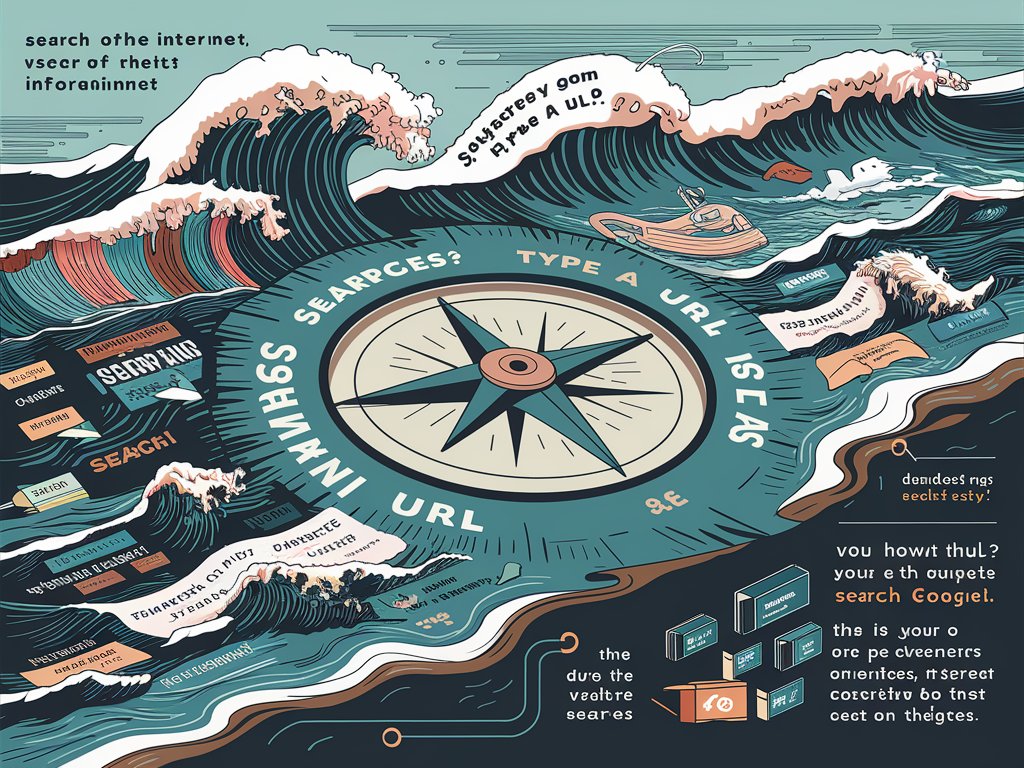The vast ocean of the internet holds a wealth of information, entertainment, and resources. Navigating the internet requires a compass, starting with a simple question: “Search Google or Type a URL?” This simple question is important for your online search. Knowing the differences between approaches helps you use the internet better.
How search engines work and why website addresses (URLs) are important. We will provide you with the information necessary to choose the best method for your search goals. We will also help you use search engines like Google effectively. Additionally, we will explain how a URL is structured.
Search Engines: Your Digital Gatekeepers
Search engine like Google, Bing, and DuckDuckGo act as gateways to the vast information available online. They function by:
Crawling:
The Search engines deploy software programs called “crawlers” or “spiders” that constantly scan the web, discovering and indexing websites.
Indexing:
Crawlers examine website content like text, images, and code, storing it in an index for later use.
Ranking:
When you search for something, the search engine looks at the keywords you entered. It then finds relevant web pages based on those keywords. The search engine ranks these web pages using a complicated formula. This algorithm determines the ranking of websites by considering factors such as content relevance, website trustworthiness, authority, and user experience.
Displaying Results:
The search engine then presents a list of ranked websites, also known as Search Engine Results Pages (SERPs), along with snippets of their content to help you determine if they match your search intent.
Also Read: VSCO Search: Plot a Visual Playground Course
Understanding Search Queries: Crafting the Perfect Question
The success of your Search Google or Type a URL hinges on your ability to formulate an effective search query. Here are some key tips:
Clarity is Key:
Clearly define your search intent. What information are you seeking? Are you looking for a specific product, researching a topic, or simply browsing for entertainment?
Keywords Matter:
Utilize relevant keywords to describe your search. Focus on words and phrases that accurately represent what you’re looking for.
Get Specific, But Not Too Specific:
Strike a balance between specificity and broadness. While including relevant keywords helps narrow down results, overly specific queries might exclude valuable resources.
Use Boolean Operators:
Leverage operators like AND, OR, and NOT to refine your search further. For example, searching for “pizza restaurants AND outdoor seating” will filter results to restaurants with both features.
Beyond the Basic Search: Advanced Techniques for Power Users
Once you’ve mastered the fundamentals, explore Google’s advanced search functionalities:
Search Operators:
Google offers a range of operators for precise searches. Use quotation marks to search for exact phrases, like “best historical novels,” or utilize the asterisk (*) as a wildcard to find variations of a word, like “camera lens *.”
Filter by Date:
Limit results to a specific timeframe by using the “dd/mm/yyyy..dd/mm/yyyy” format after your query. For instance, searching for “climate change news 2023..2024” will display news articles published between 2023 and 2024.
Search by File Type:
Locate specific file formats like PDFs or documents by including “filetype:pdf” after your query. This is useful for finding academic papers or official documents.
Site-Specific Search:
Search within a specific website by using the “site:website.com” operator followed by your keywords. This helps refine your search when you know the information likely resides on a particular platform.
The Power of URLs: Demystifying Website Addresses
A Uniform Resource Locator (URL) is the unique address that identifies a specific webpage or resource on the internet. Understanding the anatomy of a URL allows you to navigate directly to desired websites without relying on search engines.
Protocol:
This specifies the communication method between your browser and the server hosting the website. The most common protocol is “http” (Hypertext Transfer Protocol), but you might also encounter “https” (secure http) for encrypted communication.
Domain Name:
This is the unique identifier for a website, typically appearing after the protocol and a colon (“:”). For example, in “https://www.google.com,” “[invalid URL removed]” is the domain name.
Subdomain:
Some websites use subdomains to Tell apart parts. For instance, “www” in the previous example is a subdomain often used for the main website.
Path:
The path indicates the specific location of a webpage within a website’s directory structure. For example, in “https://www.google.co.uk/“, “/search” represents the path leading to the search function within the Google website.
Query String:
This optional component appears after a question mark (“?”) and contains additional information specific to a webpage. For instance, a search query on Google might look like “[invalid URL removed]” where “q=search+ engines” is the query string specifying the search term “search engines.”
When to Use “Search Google” vs. Typing a URL:
The optimal approach depends on your search intent and existing knowledge:
Use Search Google When:
o You’re unsure of the exact website containing the information you seek.
o You’re exploring a broad topic and require diverse perspectives.
o You want to discover new websites or resources on a particular subject.
o You need to compare information from different sources.
Type a URL When:
o You know the exact website containing the information you need.
o You’re revisiting a website you’ve used previously.
o You have a specific webpage bookmarked and want to access it directly.
o You’re dealing with sensitive information and require a secure connection (look for “https” in the URL).
Optimizing Your Web Navigation: Combining Search and URLs
Leverage the strengths of both approaches for a more efficient online experience:
Start with Google Search:
Begin by using Search Google or Type a URL to explore a broad topic and identify relevant websites.
Refine with URLs:
Once you’ve identified key websites from the search results, utilize their URLs for direct access to specific pages within those websites.
Bookmark for Future Reference:
Websites you find valuable by bookmarking them for easy access later on. This way, you can revisit them without having to search for them every time.
Combine Keywords and URLs:
Combine keywords with website names or subdomains in your Google search to refine results further. For example, searching for “best pizza recipes https://www.allrecipes.com/recipes/” will prioritize results from the All recipes website.
Beyond the Basics: Advanced URL Techniques
For savvy web navigators, consider these advanced URL techniques:
Shortened URLs:
Many websites utilize URL shortening services to create concise links. However, be cautious with shortened URLs as they can mask malicious websites. Only click on shortened URLs from trusted sources.
Dynamic URLs:
Dynamic URLs contain parameters that change depending on the specific content being displayed. Basic URL structure can still help you navigate within websites that use dynamic URLs.
URL Parameters:
For advanced users, understanding URL parameters can allow for deeper customization of website experiences. This typically requires knowledge of specific website functionalities.
The Final Verdict: Mastering the Art of Navigation
Knowing how to use Search Google or Type a URL can help you navigate the web with confidence. This knowledge is useful whether you are searching for information or typing in a specific link.
By mastering these skills, you can easily find what you are looking for online. This will make your internet browsing experience more efficient and enjoyable. You can become an expert at exploring online content by using various search methods and understanding URLs.
First, learn different search methods. By doing this, you can go from casually browsing the web to becoming an expert at exploring online content.







